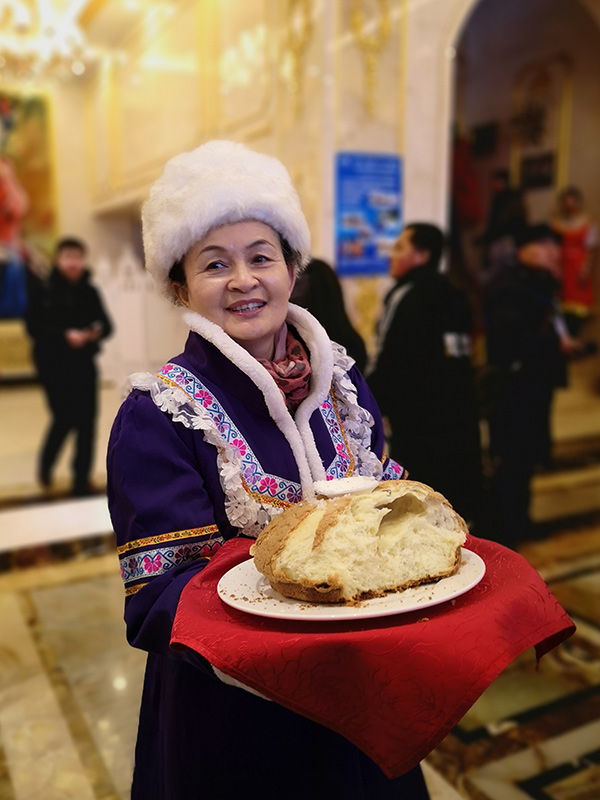A festival frozen in time


A woman from Ergun greets guests by offering them khleb (bread) dipped in salt. [PHOTO BY XU LIN/CHINA DAILY]
A three-hour drive along the border brings travelers to Ergun, next to the Greater Hinggan Mountains and Hulunbuir Grasslands.
Twenty-one ethnic groups inhabit the city.
Scalloped domes and tent roofs dot the cityscape.
Many of the ethnic Russian locals speak fluent Chinese. They've preserved many of the traditions of their immigrant ancestors.
Many Chinese settled along the border when the Chinese Eastern Railway was completed in the early 1900s.
A gold rush between the end of the 19th and early 20th centuries lured Chinese miners to the Ergun River that forms part of the border.
Many Russians also came to the river during the period.
This history is portrayed in the local musical, The Love of Ergun.
It tells the story of a young Russian woman, who falls in love with a Chinese gold miner. They return to his hometown, Ergun, and wed.
It's a portrait of the marriages between ethnicities at the time. The fifth generation of their descendants live in the area today.
The city's Liliya Manor offers accommodation in Russian-style buildings and Russian dining and cultural experiences. Its founder, Feng Yuxia, is the second-generation descendant of a Chinese-and-Russian family. She makes khleb (bread) according to her Russian grandmother's recipe.
Locals in traditional Russian garb greet guests by observing a tradition of offering them khleb dipped in salt.
The manor's Khleb Culture Center showcases khleb culture. Visitors can watch hosts make the bread or make it themselves, and sample different flavors and shapes.
Indeed, the warmth of the locals is one of the many appeals that make Hulunbuir a hot destination in the cold season.
Contact the writers at xulin@chinadaily.com.cn
MOST POPULAR
- 1 China to give visa-free treatment to another 9 countries
- 2 China fully opens manufacturing sector to foreign investors in landmark opening up move
- 3 China's import expo attracts record-breaking participating countries, exhibitors
- 4 China's door opening even wider to foreign visitors, businesses
- 5 China revises rules to ease foreign strategic investment in listed firms
Editors' Picks
 Infographic:
China's public holidays for 2025
Infographic:
China's public holidays for 2025
 Infographic:
Basic facts of APEC
Infographic:
Basic facts of APEC
 Infographic:
Wrapping up the 7th CIIE: Data recap
Infographic:
Wrapping up the 7th CIIE: Data recap




